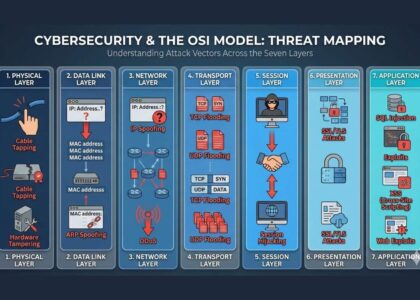Introduction: The Rise of Ethical Hacking
We live in a world where everything is digital—from your banking to your dating life. And where there’s data, there are threats. But thankfully, there are also protectors—ethical hackers. They are the digital warriors who use their hacking skills for good, not evil.
If you’ve ever wondered, “Can I really make a living out of ethical hacking?” — the answer is a big, bold YES.
Ethical hacking isn’t just a niche hobby anymore. It’s a booming industry with diverse career opportunities, attractive salaries, and global demand.
In this blog, we’ll break down:
- What ethical hacking is (briefly)
- Core skills needed
- Top job roles you can get
- Real-world industries hiring ethical hackers
- Salary expectations
- Certifications that help
- How to get started
Let’s dive in.
What Is Ethical Hacking? (A Quick Refresher)
Ethical hacking means using hacking techniques to find vulnerabilities in systems, networks, or applications legally—with permission. Think of it as getting paid to break into systems… to fix them before the bad guys do.
You’re basically performing penetration testing, vulnerability assessments, and security audits for organizations that need their data protected.
Now that we’ve got that out of the way, let’s answer the real question…
What Jobs Can You Get With Ethical Hacking Skills?
Here’s the exciting part—ethical hacking opens the doors to numerous career paths, depending on your skill set, interest, and level of experience.
Let’s explore them in detail.
1. Penetration Tester (Pen Tester)
What They Do: Simulate cyberattacks to test how secure a system or network is.
Why It’s Cool: You get to think like a hacker and use tools like Metasploit, Burp Suite, and Kali Linux to exploit systems—legally.
Industries: Government, financial services, healthcare, tech firms.
Salary Range:
- Entry-Level: $60,000 – $85,000
- Experienced: $90,000 – $130,000+
Certifications That Help:
- Offensive Security Certified Professional (OSCP)
- Certified Ethical Hacker (CEH)
2. Vulnerability Analyst
What They Do: Scan systems to detect known vulnerabilities and help patch them before they’re exploited.
Why It’s Cool: You’re the one who finds the cracks in the system before the criminals do.
Tools Used: Nessus, Qualys, OpenVAS
Salary Range:
- Entry-Level: $50,000 – $75,000
- Mid-Level: $80,000 – $110,000+
Certifications That Help:
- CompTIA Security+
- Certified Vulnerability Assessor (CVA)
3. Security Analyst / SOC Analyst
What They Do: Monitor networks in real time, analyze security events, and respond to incidents.
Why It’s Cool: It’s like being the first responder in a digital emergency. You help contain threats before they spread.
Where You Work: Security Operations Center (SOC)
Salary Range:
- Tier 1 Analyst: $40,000 – $60,000
- Tier 2/3 Analyst: $70,000 – $100,000+
Certifications That Help:
- CompTIA CySA+
- GIAC Security Essentials (GSEC)
4. Red Team Specialist
What They Do: Simulate advanced, persistent threats to test an organization’s defense capabilities.
Why It’s Cool: This is where ethical hacking meets creativity. You think like a real-world attacker, bypassing security in clever ways.
Tools Used: Cobalt Strike, Empire, custom scripts
Salary Range:
- Experienced Roles: $100,000 – $160,000+
Certifications That Help:
- Offensive Security Experienced Professional (OSEP)
- Certified Red Team Professional (CRTP)
5. Bug Bounty Hunter
What They Do: Find vulnerabilities in companies’ software or systems and report them in exchange for monetary rewards.
Why It’s Cool: You can work from anywhere. Flexible hours. No boss. And some payouts are huge.
Platforms: HackerOne, Bugcrowd, Synack, Open Bug Bounty
Potential Earnings:
- Side Hustle: $1,000–$10,000/month
- Full-Time: $50,000 – $200,000+ (depending on skills and time invested)
Skills Needed: Web application security, recon, scripting
6. Ethical Hacking Consultant
What They Do: Work independently or with a firm to perform audits, pen tests, and provide cybersecurity advice to clients.
Why It’s Cool: High flexibility, project-based work, and you can charge premium rates.
Typical Clients: Startups, SMEs, law firms, hospitals, fintech.
Earning Potential:
- Freelance Consultant: $75 – $200/hour
- Full-time: $90,000 – $150,000/year
7. Cybersecurity Engineer
What They Do: Build and manage secure systems, detect threats, and implement protective measures.
Why It’s Cool: It’s like being a digital architect. You design things that are hard to break into.
Skills Needed: Networking, cloud security, firewalls, intrusion detection systems.
Salary Range:
- Mid-Level: $90,000 – $130,000+
- Senior: $140,000+
8. Malware Analyst / Reverse Engineer
What They Do: Deconstruct malware to understand how it works and how to defend against it.
Why It’s Cool: You get to look under the hood of viruses, trojans, and ransomware.
Tools Used: IDA Pro, Ghidra, Wireshark
Salary Range:
- Starting: $80,000 – $100,000
- Expert Level: $120,000 – $180,000+
9. Cybersecurity Researcher
What They Do: Discover new vulnerabilities, publish research, and sometimes work with government agencies.
Why It’s Cool: You contribute to the security community by sharing knowledge that makes the internet safer.
Opportunities: Work at think tanks, CERT teams, bug bounty programs, or security labs.
10. Forensics Investigator
What They Do: Analyze data from digital devices after a cybercrime has occurred.
Why It’s Cool: You’re basically a cyber detective. You find traces of attacks, recover deleted files, and help build legal cases.
Industries: Law enforcement, legal firms, corporate security teams
Salary Range:
- Entry-Level: $50,000 – $80,000
- Senior Roles: $90,000 – $140,000+
11. Chief Information Security Officer (CISO)
What They Do: Oversee all security strategies and manage cybersecurity teams in an organization.
Why It’s Cool: You’re in charge of protecting millions—or even billions—of dollars in digital assets.
How to Get There: Years of experience + leadership + business understanding
Salary Range:
- Mid-Size Company: $150,000 – $250,000
- Fortune 500: $300,000 – $500,000+
Which Industries Hire Ethical Hackers?
You don’t have to work for a cybersecurity company. Ethical hackers are needed everywhere:
- Banking & Finance (Protecting money and accounts)
- Healthcare (Securing patient records)
- E-commerce (Preventing payment fraud)
- Government & Defense (National security, military systems)
- Telecom (Protecting communication infrastructure)
- Education (Securing student data and online learning tools)
- Media & Entertainment (Preventing leaks, piracy, and breaches)
Soft Skills You’ll Need
Besides tech skills, great hackers have these human qualities:
- Curiosity: Always asking “what if?”
- Attention to detail: Small flaws can cause big breaches.
- Problem-solving mindset
- Persistence: It’s not always easy, but it’s rewarding.
- Ethics: You’re trusted with sensitive data. Integrity matters.
Certifications That Employers Look For
While skills matter most, certifications can get your resume through HR filters:
- CEH (Certified Ethical Hacker) – Best for beginners
- OSCP (Offensive Security Certified Professional) – Highly respected, hands-on
- CompTIA Security+ / PenTest+ – Foundational knowledge
- CISSP (Certified Information Systems Security Professional) – For senior roles
- GPEN / GXPN (SANS GIAC) – Advanced pen testing
How to Get Started in Ethical Hacking?
Step 1: Learn the basics of networking, Linux, and cybersecurity
Step 2: Take an online course (Try Hack The Box, TryHackMe, or platforms like Udemy)
Step 3: Practice with CTFs (Capture the Flag) and bug bounty platforms
Step 4: Get a certification (CEH or OSCP)
Step 5: Build a portfolio (Write blogs, post walkthroughs, show your GitHub)
Step 6: Apply for internships, SOC roles, or junior pen tester positions
Final Thoughts: Ethical Hacking Is More Than a Job—It’s a Mission
Cybersecurity isn’t just a tech job. It’s about protecting people, businesses, and nations from invisible threats. If you love problem-solving, technology, and making a real impact, ethical hacking can be your life’s calling.
There’s no one “job” for ethical hackers—there’s a whole ecosystem of roles. Whether you’re a lone wolf hunting bugs at 2 a.m., or a corporate defender in a SOC, your skills are valuable—and needed.
So go ahead. Start learning. Start hacking. Start protecting.
The world needs more ethical hackers like you.
Over to You
- Which of these roles excites you the most?
- Are you already learning ethical hacking?
- Want help creating a roadmap?
Let’s chat in the comments—or DM me if you’re building your cybersecurity journey.






